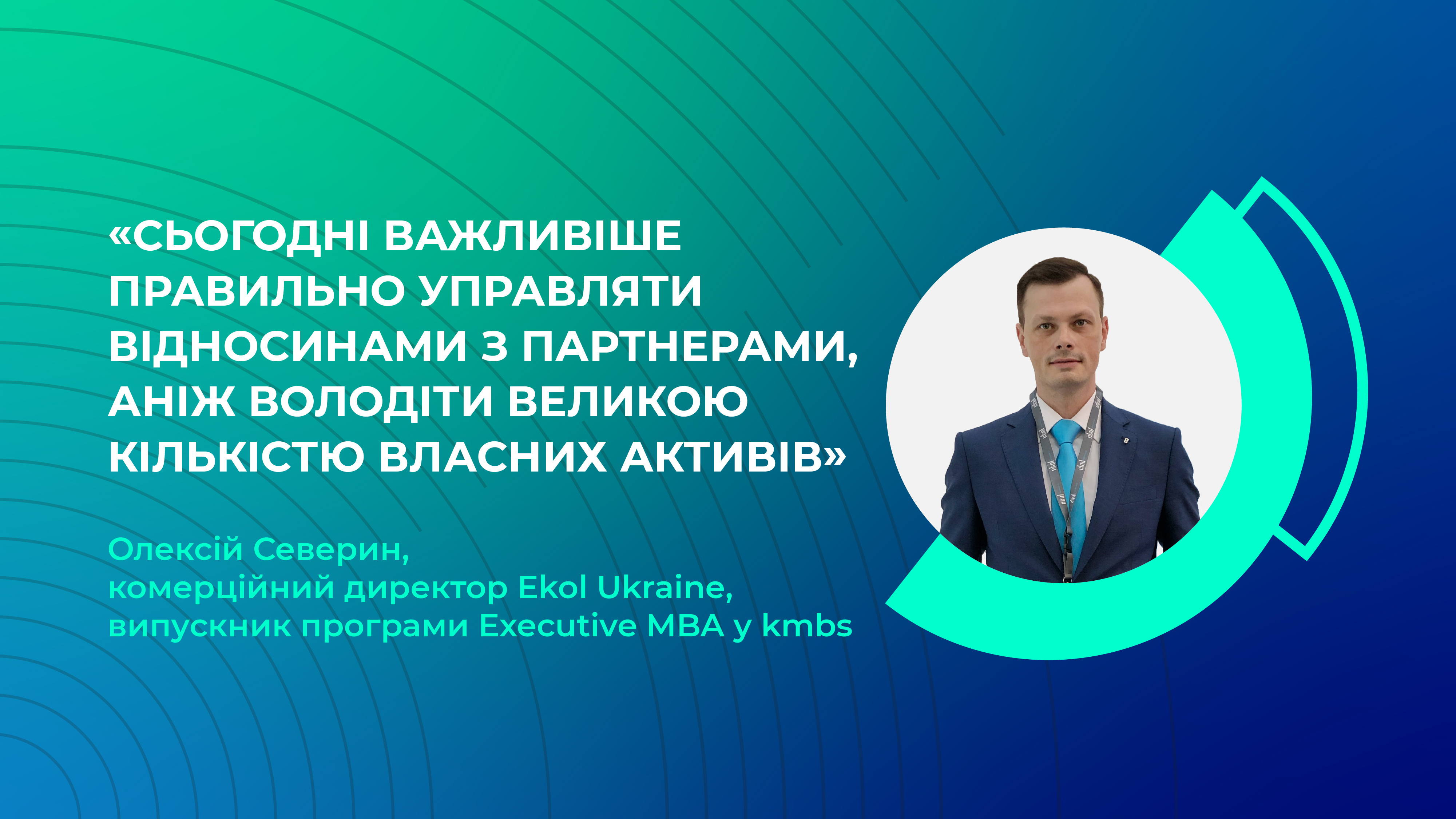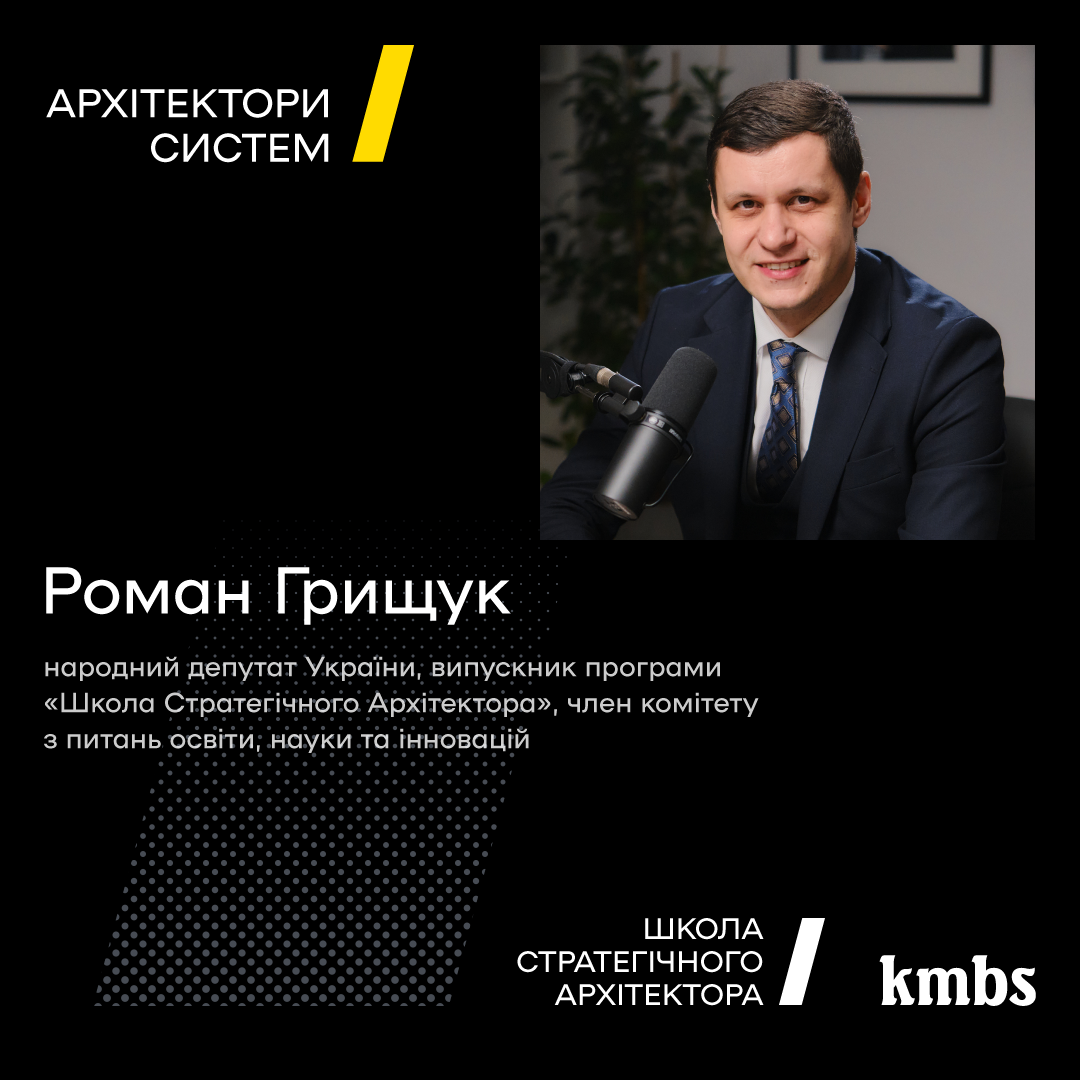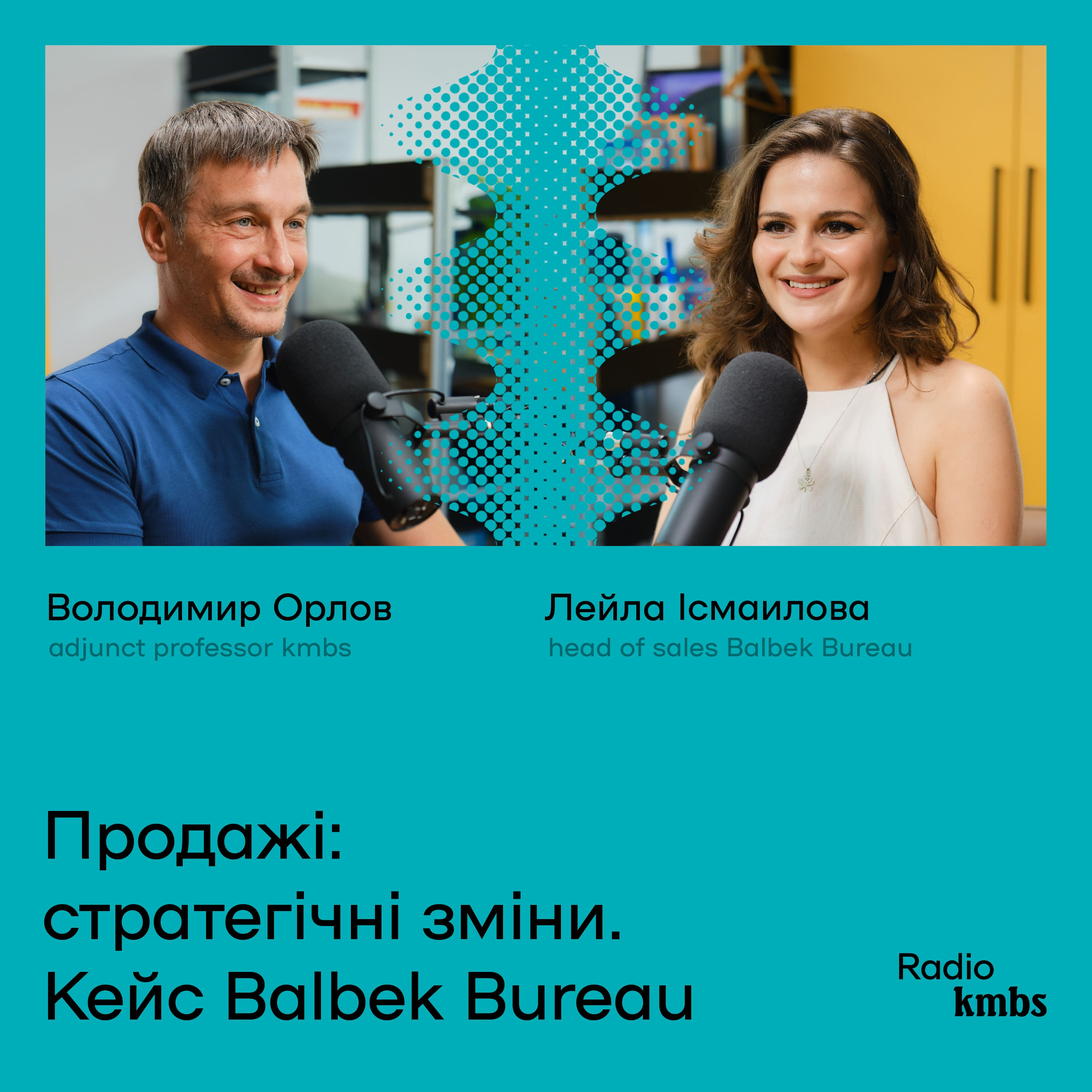Changes in business models and cultural transformation usually start from a change in the way of thinking. This is what happened at Ekol Ukraine: the training of its Commercial Director Oleksii Severyn in the Executive MBA program at KMBS triggered a chain reaction. Within a few years, the organization has completely transformed its working logic, which enabled it to grow up to 25% per year in a stagnating market and to become the most successful representative among 15 European Ekol branches. Oleksii told us how it was going on.
Vision and Product
Seven years ago, we were a classic outsourcing company that was good at managing available resources. Our main customer was a logistics specialist.
At kmbs, I learned how to shape a vision, mission, values, strategy, systematic thinking, business systems modeling, and many other. We did not just implemented all this, but integrated it in our internal philosophy.
Gradually, we came to a clear understanding that we are able to create a high value, and not just for a logistics specialist. The boundaries of our system have become wider. We no longer see ourselves only in the logistics business. Currently, we are a solution provider, providing the customers with an opportunity to scale up their business and grow steadily. We do this through providing logistics services.
Logistics is a core of our product, its "hard" part. But that's not all: we can provide solutions within the entire supply chain. We work from a manufacturer to a store shelf. A customer can significantly increase its business efficiency and competitive advantages by outsource a part of the work to us as a single provider.
Each product, traveling through the supply chain, passes certain stages (transportation, customs clearance, warehousing, etc.). At the junction between these stages, there are "islands of inefficiency". Problems accumulate if different contractors work at each stage. And a single-provider solution allows to get rid of "islands of inefficiency". So, the wider the boundaries of our product, the more value we offer to our customer.
We are also in an active process of building an ecosystem. It already exists, but it is not formalized, and we want to attract more players. They will assist in "covering" those competencies that we do not have and do not see the point of developing them in our company. For example, we provide only 7-8% of deliveries using our vehicles. The rest is provided by our partners.
Challenges and Solutions
Our sector is living in a time of scarcity of resources. Our company employs about 900 employees, we offer more than the average market salary, but we strongly feel shortage of human resources.
The second shortage is investments. Currently, Ukraine is not a priority area for investments. This affects the logistics infrastructure: for example, there is a catastrophic shortage of warehouses in Kyiv.
One more observation in respect of our market: big players are getting bigger and weak players are getting weaker. This is true for logistics providers, retailers and distributors. It just seems that customers of smaller logistics companies have to move to larger ones, but a shortage of resources prevents them from doing so.
This results in a great demand for our product, but we do not have enough resources to meet it: transport, people, premises. We have a vision, we understand a customer and a product, but the external context limits us.
All this supports our thesis that we need to create an ecosystem. This is because partners will help solve the problem of own resources shortage. We already have experience of using warehouses of our partners (including former competitors) for cargoes of our customers. Our task here is to efficiently manage third party resources.
In the past, if a competitor's business was bad, it worked for the company. But now we are interested in the development of our competitors. Moreover, we are ready to teach and develop them ourselves. After all, strengthening of their product will strengthen the value we create together.
In the ecosystem, competition can already work for partners. For example, several large companies that do not have enough vehicles can compete for a vehicle owner. To solve this problem, you can offer them additional privileges: such as sharing a discount on fuel we have. Cheap fuel for a vehicle owner will mean an increase in margins. You can sign a joint agreement with an insurance company (it will be profitable for him), offer him assistance with drawing up tax documents, to help arrange leasing under convenient terms, and so on. We have already implemented some of these steps, and now we are working on the rest.
Currently, it is more important to properly manage relationships with partners than to hold a large number of own assets, because building and developing of non-core competencies is a long and expensive process, while the context changes too quickly, and the component determining business performance migrates. That's why the company needs people who will develop partners, and they are already starting to appear in our country.
Resistance and Outcomes
You have to start to give a little to get a little is a principle in ecosystem building. Many companies that could join the ecosystem are very private. You need to communicate with them, to raise their awareness about the benefits of working in the ecosystem.
We also should work with colleagues within the company, because not everyone understands why we have such a vision. Fortunately, our CEO and the core of the leadership team share a common vision. Although not all of our leaders have studied at kmbs, I have shared my knowledge with them, and they see a great value in the ecosystem approach. I also consider the role of a catalyst for transformational change as one of my roles in the company.
The first results best help to convince our colleagues when we launch a number of projects together with our yesterday's competitors. For example, one of the stages of the logistics process is the customs clearance of cargoes. The company has a unit that deals with this, but we understand that our qualifications are not enough for some customers.
For example, one of our key customers has more than 170 suppliers in Europe, but because of its business model, it buys small consignments from them. The scope of our responsibility in this cooperation is communication with all the suppliers. Our customer only places an order, an our work starts when we receive the message that it is ready. We have to consolidate small consignments in European warehouses, deliver them to Ukraine, clear the cargo along the way, and then bring them to the store. We should do this as soon as practical.
In terms of customs clearance, we turned to our then competitors (and now partners), because we understood that this was their key competence. We get out a message for them of the need to be open for a stronger joint offer for a customer — and they agreed.
What's interesting is that we expected resistance from the customer, but there was none. It was probably because we managed to show the value of cooperation with a competitor — a significant reduction in delivery time and an increase in the quality of drawing up documents. This allows our customer to receive the product earlier and, accordingly, longer to sell it at the full price before the start of the sale season.
An ecosystem cannot be created without trust. If there is no trust, there will be mutual suspicions, and there will be no partnership. That is why it is important to gain trust on the shore. This is what we've experienced with our then competitor.
Changes in Customer's Awareness
Our pool of customers also has changed along changes in our vision. Previously, our main customer was a logistics specialist. Now we have divided this role into three components: first, a logistics specialist in the classical sense of the word, second, the supply chain architect (they have different role needs: the architect builds a system, and the logistics specialist works with a ready-made structure), third, operations director (this is a transitional position between the architect and the logistics specialist).
Now our main customer is the one who considers logistics in the supply chain as a driver of scaling up and development. Based on this definition, our customers are CEOs of companies (or the owners, if they manage the business), who are committed to a strategic partnership and share our values. For example, they are open, because consider openness as a prerequisite for the development. Our dialogue with them always begins with a strategy.
We've also realized that if we do not consider all the roles within the pool of customers, do not think of a value proposition for each of them, we will not be able to reach the key customer — the CEO or the owner. Because in order to give us a part of their supply chain, they need to "mature": to look at their own business differently, to see that their main competence is not logistics, but something different.
That is why the role of an "innovator" has emerged, i.e. a person who raises awareness about the importance of innovations among the company employees. This role may be performed by many people - logistics and finance specialists, businessmen etc. It is a person who understands that the business models may be developed through innovations. Also he/she communicates this idea to the CEO.
The main need of the "innovator" is to be heard, this is the way to self-fulfillment. These people have critical and lateral thinking. They may not be personally engaged in the implementation of innovation , but they can urge the business to move in this direction. Due of our work with "innovators", we managed to reach our main customers faster.
Besides, I hit upon an idea of setting up such a role during discussions with my mentee under the kmbs mentorship programme. Mentorship is always a two-way road, that is why both mentors and mentees may experience insights.
Cooperation at different levels
For a customer, the cooperation with us often means the need for reconstruction of the business model and change of the culture. For instance, a client had a warehouse. It means that there was the production culture with low subjectivity. This culture often runs counter to the culture existing in the marketing or sales departments.
If the company outscores its warehouse logistics function to us, it can focus on setting up the single culture which is in line with the owner's values. This way we not only help change business models of our customers, but also take part in the transformation of their organizational culture.
Having realized this, we started talking to our customers: we try to learn more about changes in their companies, and our impact on such changes. We can see that our assumptions are true.
Transformation of own culture
Our culture has changed greatly for the last six years. Today we devote more attention to the "soft" skills instead of "hard" skills when recruiting employees. We believe it is easier to teach a person with similar values than try to change an already good specialist who is different from us.
Many times we have faced the situation when a good specialist can not get accustomed to our culture. It has been my dilemma for a long time, but now it's gone. If a person does not share our values, we do not employ him/her.
We do not have a holocracy right now, but it seems that we are approaching it. At the moment we have democratic and liberal work style. We do not force people to implement ideas, they should be ready for it. For example, my offer was to create a small corporate library of 25 books. We did it together with our customer "Nash Format" publishing house. The employees read the books, but they do not bring new ones. It was suggested to appoint somebody responsible for the library, but I am sure it would not work in our company. If a person is not inspired by the idea, there will be no good result. Probably, it's not a good time for this initiative.
We believe that the modern world becomes more complicated. Innovative products emerge in interdisciplinary fields. Strong companies appear and form new organizational culture which has several dimensions.
We have defined three of them. The first one is the strong process culture, the use of procedures that ensure efficient processes in the product core. The second one is called smart organization, the thoughtful approach which helps find the best decisions. This is primarily about the soft component of our product. The third dimension is partnership and focus on our customers.
Some people think that development is possible on the border between order and chaos. Chaos is not an antonym for order, it is the essence which comprises all the orders. Chaos means development opportunities. This is our vision of the culture, the most important thing is to align these three dimensions.
We are interested in mature people who want to fulfil their potential. Our task is to create appropriate conditions for them, to be a platform for their development. Interaction with mature personalities involves couching and mentorship, rather than total control and instructions. I believe that "I know better than others" management approach is sinking into oblivion. At present facilitating leadership, where the team role has the highest priority, is at the forefront.
It is clear that it concerns offices rather than warehouses with their own culture, because such holocratic logic would destroy them. Therefore we have such cultural dimensions functioning together, and we support this balance. This allows us to communicate our values to the customers, to create good product and engage the partners into the ecosystem.
Business and meanings
Business for us is not only money, but also the creation of meanings. We would like the majority of our employees to understand it. Now we are implementing an interesting project "Cultural code" together with Andrii Melnyk, another kmbs graduate. The purpose of this project is to create the team's cultural code and a common semantic core. The result of the project may be the definition of key concepts that coincide with our values, creation of metaphors of these concepts and histories illustrating them. The problem is that the same concepts may be understood differently be the team members. For instance, a leader can be a person who inspires for some of them, while for others it can be "the red army commander".
That is why we hold a series of meetings and read business and philosophical literature, study videos and reflect. This helps us find own metaphors and histories of the concepts and create a common semantic core. We are planning that 15 our employees who have certain impact on changes will take part in these discussions. Later it will be easier for them to communicate the important things to their colleagues.
In fact, we need to create a "common language" for all members of our organization. Because our company is growing rapidly, we have a lot of newcomers. We do not want to have a huge gap in values, and try to avoid hiring accidental employees with different values.
What is next?
Now we create our vision-2030. We are holding a series of workshops and think of our future prospects and boundaries of our system and super system. We see ourselves as a multifunctional and technological platform of the delivery chain, the key player in the national logistics system, the trigger for the Ukrainian economy. This will be implemented through the partnership with national companies and building of a business ecosystem.
In the future we want to integrate the delivery chain and continue to move towards automation and digitalization. Nowadays it is not economically feasible, but can be very promising because of the lack of human resources. We believe that automation can drive our exponential development. That is why we are engaging in digitalization and involving our ecosystem partners into this process.
Also we want to be a subject for the local community. Our office and leadership are located outside Kyiv, but we are registered in the capital and pay taxes to the city budget. It turns out that we do not give anything to the community, though we want to do so. We would like to help community develop. If more people live here, it will be easier for us to find potential employees.
Now we are negotiating with local mayors to choose a place to re-register our company. Our payments to the village budget can double it. Our task is to select a settlement headed by a person who has a big idea. The mayor should be a like-minded person who shares our values. We do not want simply to pay, we believe that business can drive great changes.
Personal development
I entered KMBS to get practical knowledge, and now I understand the importance of the "soft" training component, that is, change of thinking. It is the component that enables us to see a little bit more than we could before, to take into account external context and understand our influence on it, to think over the meanings that we produce. I started to think about these issues after graduation from kmbs, and I appreciate the changes caused by them even more than business knowledge I had obtained.
During my training, I realized a lot of very important things. One of them is that we should not only understand the meanings produced by other people, but to create our own meanings for others.
Now it is happening in my life. I am a mentor for several employees in my company.
My leadership style has also changed. When you broaden the borders, you can see more and give freedom to people. Be sure, they will succeed. The stronger the people beside us, the broader ambitions of the group core. It expands the borders of our system.










